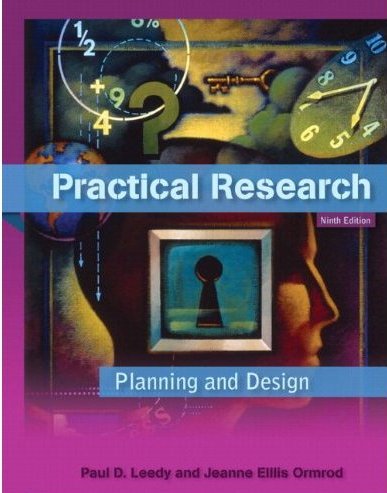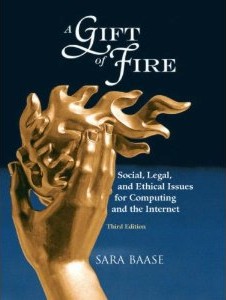Syllabus
CSC 426 - Values and Computer Technology
Tuesdays 5:45-9:00
INSTRUCTOR NAME: Bamshad Mobasher
OFFICE: CST 833
PHONE: 312-362-5174 (Office)
E-MAIL: mobasher@cs.depaul.edu (this is
the preferred contact)
OFFICE HOURS: Mon. and Tue.
4:00-5:30 PM.
COURSE DESCRIPTION
The goal of this course is to help prepare you, both for the work involved in obtaining a PhD in Computer Science, including developing a research agenda, understanding the process of doing research, and writing a dissertation, etc., as wells as for your future research career as a computer professional or academic.
In doing so, we will try to cover some of the following topics:
-
What is research and what it means to have a PhD;
-
Basic issues in research methodology and different types of research;
-
Writing and evaluating technical research papers;
-
Developing a research proposal;
-
Writing a PhD Dissertation;
-
Some ethical issues in scientific research and professional responsibility.
The activities in the course will include writing a review of a technical paper, writing and presenting (in class) a research proposal, active participation in class discussion, and leading a part of one class session. In addition, we will have guest presentations by various faculty about their research and their experiences both as a graduate students as well as as faculty members. Note: Attendance is required for this course; if you are not able to attend the class for a particular session, you need make prior arrangements with me in advance.
COURSE TEXTS & MATERIAL
Required and recommended books are listed below. In addition, We will use numerous online resources and articles. The resources directly relevant to topics covered in the course are listed in the Weekly Topics section. Additional resources can be found on the Resources section.
|
Required Text |
|
|---|---|
 |
Paul D. Leedy and Jeane Ellis Ormrod, Practical Research: Planning and Design, 9th Edition, 20 |

|
Justin Zobel, Writing for Computer Science, 2nd Edition, 2005. |
|
Recommended Texts |
|

|
Sara Baase, Gift of Fire, A: Social, Legal, and Ethical Issues in Computing and the Internet, 2008. |

|
William Strunk Jr., E.B. White, Roger Angell. The
Elements of Style, 4th Edition, 2000.
This is the classic reference book on how to write good English well. Should be in your library. This information is available on the web as well. |

|
John Grossman, The Chicago Manual of Style : The Essential Guide for Writers, Editors, and Publishers, 15th Edition |

|
Allan A. Glatthorn, Writing
the Winning Dissertation : A Step-By-Step Guide, 1998. Contains an excellent cookbook for writting dissertation chapters and you may find it a good investment. |
COURSE REQUIREMENTS
- Writing a review of an article
- Writing a research proposal
- Leadership of class for part of one class period
- Giving a class presentation of your research proposal
- Reading and other class assignments
- Active participation in class discussions
GRADING POLICY
|
Requirement |
% of Grade |
|
Article review |
20% |
|
Research Proposal |
40% |
|
Class Leadership |
20% |
| Proposal Presentation |
10% |
| Reading Assignments and Discussion |
10% |
|
TOTAL |
100% |
Article
Review
You will be assigned an article during the first week of class to
review as though you are functioning as a journal or conference reviewer.
Your job is to determine the worthiness of this article for
publication, and to provide constructive and critical feedback to the
author. I expect a reasonable document to the authors to be
3- 5 pages, but these are not absolute limits. A review form will be
provided that can be used as a guide.
Research Proposal
Beginning the first week you should start looking for a topic for your
research proposal. You will need to submit the title and an abstract (one to
two paragraphs) of your research proposal on Week 3. The format of the
proposal will be based on the DePaul University Research Council Competitive
Research Grants (http://www.depaul.edu/~acafflpc/section3.htm).
Your proposal will include a presentation of the problem, the theory, any relevant literature review, hypotheses, and a detailed description of the design or method to be used. Basically, it is a journal article without the results or discussion. Your structure may vary some from this model based on the methods you are using. Your final research proposal should be 5-6 pages long. Spelling and grammar count towards your grade.
More information on the research proposal can be found in the Research Proposal section.
Class
Leadership and Participation
Our class will be run as a doctoral seminar. I will lead
the class during weeks 1-3, but after that each student will participate
in leading a class session. You will lead topics individually or in pairs of
two. Topics will be assigned, in part, based on your preferences and will
be based on the materials covered during weeks 4-8 (see Weekly
Topics).
For your topic the class will read the assigned material and resources before the assigned date. Generally, your starting point will be the material assigned in the text or as part of the class reading material for that week. You should supplement that material with other online material that is listed under "resources" for that week. It is your task to integrate and present this material in a coherent fashion and cover the most important aspects of the topic thoroughly. You may assign additional readings if necessary (check with me first). The portion of the class that you will lead will be approximately 90 minutes. It is up to you as to how you wish to lead the class. You may lecture for all or part of the class, provide discussion questions in advance, lead structured activities, etc. I will participate as another member of the class.
On the weeks you are not leading, it is expected that you will have completed the assigned readings, will actively participate in the class discussion, and will provide feedback on the presentations..
Final
Presentation
In the last two weeks of the class, you will give a class
presentation of your research proposal. Your presentation will need to be
concise and should follow roughly the same organization as the proposal. You
have a total of 20-25 minutes for your presentation, including at least 5 minutes
for questions and feedback. The challenge in this part of the course is to
give an effective and concise presentation of your research proposal in a
short amount of time, much like a research presentation at a conference. We
will discuss this further in class, and some examples of proposal
presentations will be provided.
The following is the relevant portion of the University Academic Integrity Policy which applies to all courses.
- Cheating is any action that violates university norms or instructor's guidelines for the preparation and submission of assignments. This includes but is not limited to unauthorized access to examination materials prior to the examination itself; use or possession of unauthorized materials during the examination or quiz; having someone take an examination in one's place; copying from another student; unauthorized assistance to another student; or acceptance of such assistance.
- Plagiarism is a major form
of academic dishonesty involving the presentation of the work of another
as one's own. Plagiarism includes, but is not limited to the following:
- The direct copying of any source, such as written and verbal material, computer files, audio disks, video programs or musical scores, whether published or unpublished, in whole or part, without proper acknowledgment that it is someone else's.
- Copying of any source in whole or part with only minor changes in wording or syntax, even with acknowledgment.
- Submitting as one's own work a report, examination paper, computer file, lab report or other assignment that has been prepared by someone else. This includes research papers purchased from any other person or agency.
- The paraphrasing of another's work or ideas without proper acknowledgment.
- A charge of cheating and/or plagiarism is always a serious matter. If proven, it can result in an automatic F in the course and possible expulsion.
- The use of others' web/publication content (text, graphics, codes) is regarded as plagiarism without giving credit (see the above description of plagiarism).
- When you directly quote someone's work, you must put it in quotation marks. Without such quotations and reference, it is regarded as an act of plagiarism (see the above description of plagiarism).
- Using materials that the student prepared for other purposes (e.g., another course or for his/her work) needs the course instructor's prior permission.